The Operation BBQ Relief organization was founded after a tornado disaster in Joplin, MO, in 2011. Since then, the organization has shared the healing power of barbecue in 36 states across the country. Operation BBQ Relief has been deployed for almost 1,500 days, providing more than 11 million meals to disaster-affected communities, including residents, first responders, and relief workers. Now, the mission’s expanding even farther to “blue-sky days.”
In this episode of The Low & Slow Barbecue Show, we talked to Operation BBQ founder and CEO Stan Hayes, a competition barbecue champion who was the runner-up in the 2015 season of Chopped Grill Masters on Food Network. A few years ago, he was recognized as a CNN Hero for his work partnering with a great team of people to start Operation BBQ Relief.
Here’s some of the story Stan shared about Operation BBQ Relief during our podcast. First, Sweet Lew’s BBQ Pitmaster Lewis Donald reveals why the Charlotte BBQ Festival teamed up with charities.
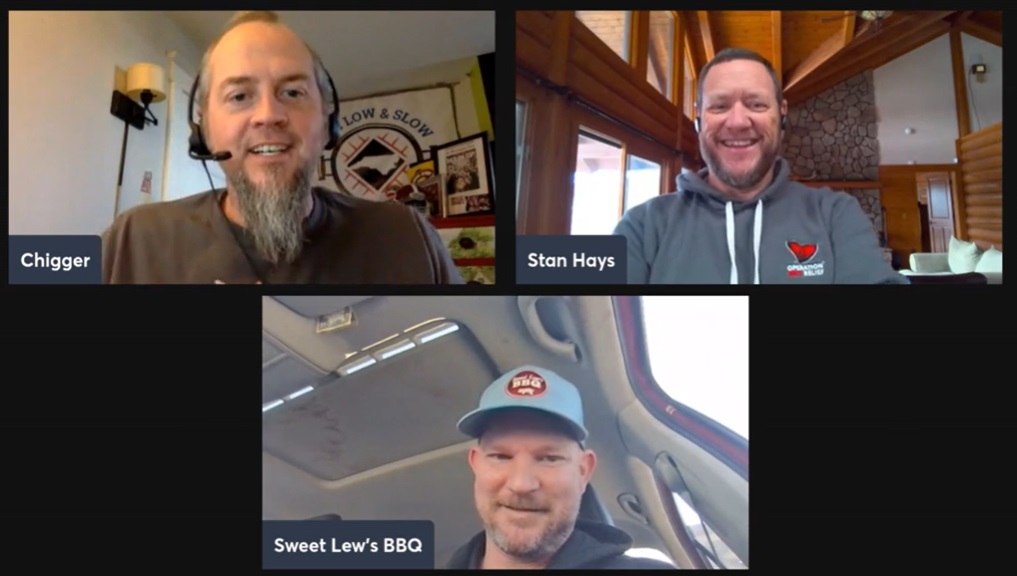
Charlotte BBQ Festival + Operation BBQ Relief
The BBQ community is special. That community has grown in the Charlotte region to become a force for good.
“I’m from the North, and you know, we would grow up doing spaghetti dinners and potlucks … to raise money for charities and churches,” Lewis says. “Down here, it’s barbecue. You see it with the Boy Scouts. You see it with a lot of churches. And I think barbecue is just that comfort food for people. It brings them all together because everybody loves barbecue.”
Combining barbecue with charity makes sense, especially when the Charlotte BBQ Festival’s #BBQForaCause mission delivers tangible results. Those “see-your-money-at-work” results are produced by 2024 beneficiaries Operation BBQ Relief, Hungry Heroes, and Folds of Honor.
“When we write checks to these organizations, I know where this money goes,” Lewis says. “And there’s one other little caveat with these three organizations. If you link them all together, they’re all very military and first-responder-oriented as well. … It’s who they serve, and it’s the people in need. It’s just unbelievable.”
First Sparks of Competitive Barbecue
Like many pitmasters, Operation BBQ Relief Co-founder and CEO Stan Hays’ live-fire passion started in college, cooking burgers on a barrel-type grill for fraternity parties. From there, he evolved into a bullet smoker before stepping up to something larger.
“About 21 or 22 years ago, I bought what I would call my first ‘Big Boy’ smoker,” he said. “I had been playing around for a few years … and it’s that passion to learn more, I guess over time, that drove me to eventually get to the point that I wanted to compete.”
Living in Texas at the time, Stan received a birthday “gift” from his wife. She volunteered to enter him in a BBQ contest at the local VFW.
“And I said, ‘Oh, Hell no,’” he explains. “I said, ‘Honey, that thing that you think is a big smoker is a little itty-bitty thing to compete on. To do everything that you have to do, it needs to be bigger.’ So, I convinced her that we would go to the BBQ contest first so she could see it because I wasn’t confident enough in what I could do yet.”
Within 5 minutes, it became clear that Stan’s “Big Boy Smoker” wasn’t nearly big enough for the Texas-size barbecue competition. However, the experience allowed a greater glimpse into a world Stan wanted to enter.
Competition becomes a BBQ Relief Operation
Attending that birthday barbecue competition inspired Stan. So, too, did popular barbecue forums, like BBQ Brethren and other online friendships.
“I just kept at it, and then we ended up moving to Kansas City,” he said. There he made in-person connections with the people he met on the barbecue message boards. “We all finally met up, and I went to my first contest, probably less than a year after moving to the Kansas City area.
“I think I got two hours of sleep the whole night and was up checking fires all night,” he said. “All this and my wife’s like, ‘That sounds horrible.’”
Not for Stan.
“It was so great,” he said. “I just love cooking it. I love the reaction of people. Like Lew said, barbecue is quintessential comfort food, so people love it.
“I don’t know another food that is used in celebration as much as BBQ,” he continues. “It’s used in the celebration of marriages. It’s used in the celebration of birthdays. It’s used in the celebration of life. From birth to death, there are very few foods that go through the evolution of being right the way BBQ does.”
Operation BBQ Relief on the Scene of Disaster
In May 2011, an EF5 tornado began just west of Joplin, MO, and intensified. As it tracked eastward, it destroyed over 4,000 buildings and damaged nearly 4,000 more, including one of the city’s two hospitals and much of its basic infrastructure. The Joplin tornado killed 158 people and injured 1,150 others. It became the nation’s most costly single tornado in history at $2.8 billion.
“If you think back in 2011, there were two major storms,” Stan says. “Tuscaloosa was about a month and a half before (Joplin). I couldn’t do much about Tuscaloosa from Kansas City with a corporate job and everything else. But Joplin is two and a half hours from my home. That became a lot more real. And I knew people in that area. I had friends. I had co-workers. I had colleagues that were in that area.
“I just remember watching it that afternoon and into the evening,” he continues. “As I was getting ready for work the next morning. My wife gets up and says, ‘You need to get your BBQ friends together, and you guys should just go to Joplin and cook.”
However, running late on a Monday, Stan initially dismissed the idea.
“I didn’t make it a mile from my house on the way to town,” he says. “So I called the guy who was my mentor in BBQ that really got me into competition. In about a 15-minute phone call, we had a plan for how we were going to go to Joplin.”
Operation BBQ Relief Mission Responds and Evolves
A location was secured, and a Facebook page was created, “Operation BBQ Relief for Joplin.” In a couple of days, the page attracted thousands of followers. At the same time, the effort attracted BBQ helpers from nine different states, including Texas, Oklahoma, Arkansas, Kansas, Georgia – even as far as Pennsylvania.
“What we thought would be a few thousand meals in a few days was 11 days of cooking in a parking lot and over 120,000 meals served,” he says. “By about day three, we knew there was such a gap that existed for real food for people and such a need. We were really uniquely qualified. We weren’t just a bunch of knuckleheads … Many of these people were competition BBQ folks.”
Competitors and volunteers heard a cry for help and responded, just as Stan did.
“I joke with my wife, especially when I start traveling quite a bit, and I’m gone a week at a time. If she starts complaining, I just remind her it was her fault. It was her idea,” Stan says. “But she sees the difference that it’s made. We’ve provided over 11 million meals in almost 13 years since the Joplin tornado.
“The majority of those are from disaster, but we also are non-disaster programs,” he continues. “I tell everybody there’s a lot more blue-sky days than there are gray-sky days every year. We started morphing and using our volunteers across the country to keep them active and keep them engaged.”
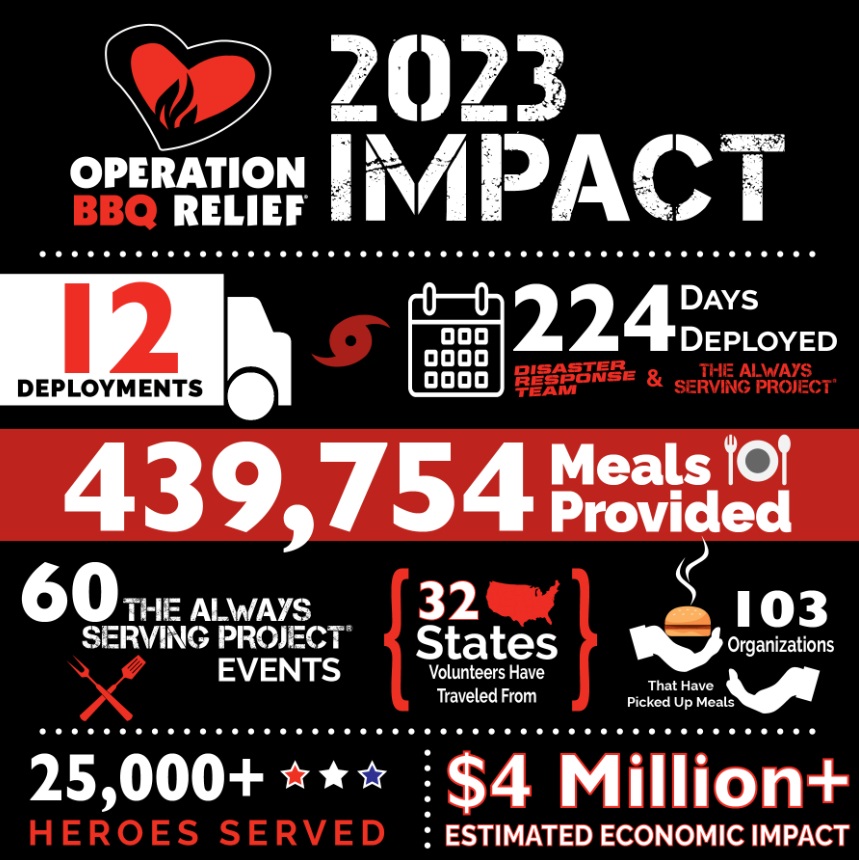
Keeping the Operation BBQ Fire Alive
In the organization’s busiest disaster-response years, about 120 days are spent providing support. That leaves a lot of other days to fill for volunteers who are spread nationwide, trained and ready to cook barbecue. As a result, Operation BBQ Relief started seeking suggestions for how to provide support in other ways.
“About eight times out of 10, they came back, and it was either something for first responders – police, fire, EMS – or active-duty military, or a reserve unit, or a guard unit when they experience a tragedy,” he says. “That started that whole side of our non-disaster programs. We call it the Always Serving Project because the people we’re serving are the ones that are always serving. They’re the ones serving their community, whether they’re on duty or off duty.”
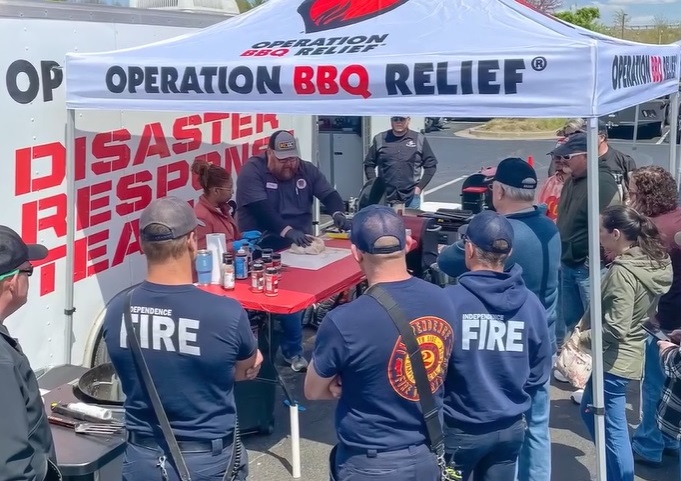
During the pandemic, those “always serving” citizens expanded to include teachers, healthcare professionals, and healthcare administrators.
“We’re celebrating all of them,” he says, “even though, for the most part, we’ve focused on first responders, veterans and active military.”
That celebration and support now includes Camp OBR, a 190-acre healing place on the Lake of the Ozarks. It serves active military, veterans, families of the fallen, first responders – and their families.
Family Healing at Camp OBR
Families of military members, veterans, and first responders fill an especially important seat at the table, Stan explains. They’re often overlooked.
“Whether it’s a physical injury or the emotional injury, those injuries can cause a lot of toll on the family unit,” he says. “We’ve got to help bring those families back together.
“How do we do this? First things first: food. It’s the greatest unifier,” he continues. “If we can take food, we can use culinary therapy.”
Likewise, bringing families together around the dinner table and strengthening communities, Camp OBR provides outdoor activities like hiking, fishing, hunting, ATV adventures, and water sports.
Revealing Gold Star Pain
Quickly, the Camp OBR Retreats became popular, but Stan and his team of 29 full-time employees sought more. They wanted to offer a retreat for Gold Star Dads, men who lost a child in military service but who aren’t often assembled. Usually, Gold Star Family retreats focus on mothers or the whole family.
“I got to meet these men, and we had everything from Dads that lost their daughters or sons, to husbands that lost their wives to fathers that lost their sons but who wanted to be with their grandson.
“Listening to a father tell you what it’s meant to meet others that have gone through the same thing they have, and break bread together around a table, and learn to cook together, and hear each other’s stories,” he says. “You want to talk about emotion. Holy cow. And then to have them tell you what it meant to get to do something like come to the camp, that’s humbling.”
A Rewarding Operation of BBQ
Serving a hot meal and providing comfort in the wake of disaster is fulfilling, Stan says. It keeps the organization going.
“When you know that people have lost somebody or lost their home, that emotion is so raw. … At the end of the day, when I look back at what we were able to accomplish, and what we’re doing, and what we’re going to be doing, that’s the pat on the back,” he says. “Whenever I get down and question what we’re doing, I used to think of the little old lady in Joplin who sat there crying, just wanting to thank somebody for a pulled pork sandwich.
“But now I think about making a place that people can come to unload some of the burden off themselves … give them a little comfort, give them some life skills around grilling and BBQ, give them a little respite here in nature, on the lake, take him out of the boat, do some things like that … It makes you excited about what we do and reminds you how BBQ changes lives.”
If you want to support Operation BBQ Relief and its projects, donate here.
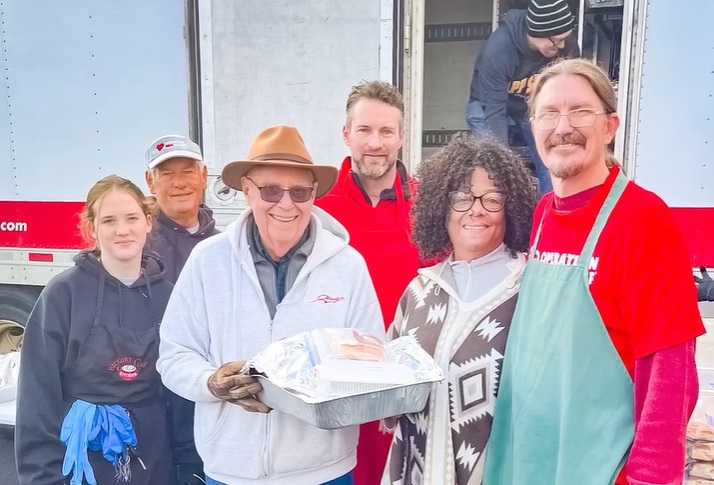
Two Days at Carolina BBQ Festival
Now in its third year, the Carolina BBQ Festival becomes a two-day event.
On the first night, Friday, April 5, Operation BBQ, Hungry Heroes, and Folds of Honor will do what they do best – serve barbecue. Co-headlining the Friday dinner menu: a crawfish boil featuring Erica “Blue Smoke Blaire” Roby, a Memphis in May first-place finisher and Food Network’s “Master of Cue.”
“She’s amazing. She really is,” Lewis says. “She can’t wait. I’ve talked to her a couple of times, and she’s more and more excited about it every time.”
For Saturday, 15+ pitmasters go to work, sharing their chosen recipes with festival-goers. Meanwhile, music fills the air thanks to Charlotte Bluegrass All Stars, Todd Johnson & The Revolvers, Carolina Gator Gumbo, Justin Fedor, and DJ That Guy Smitty.
Festival tickets are on sale at the BBQ festival website here. Get them soon because the event will sell out, as the organizers intentionally limit the crowd to ensure everyone has a good time.
Chigger’s Note: This blog reflects just a fraction of our conversation with Operation BBQ Relief CEO Stan Hays and Lewis “Sweet Lew” Donald. For the complete story, please listen to the podcast.
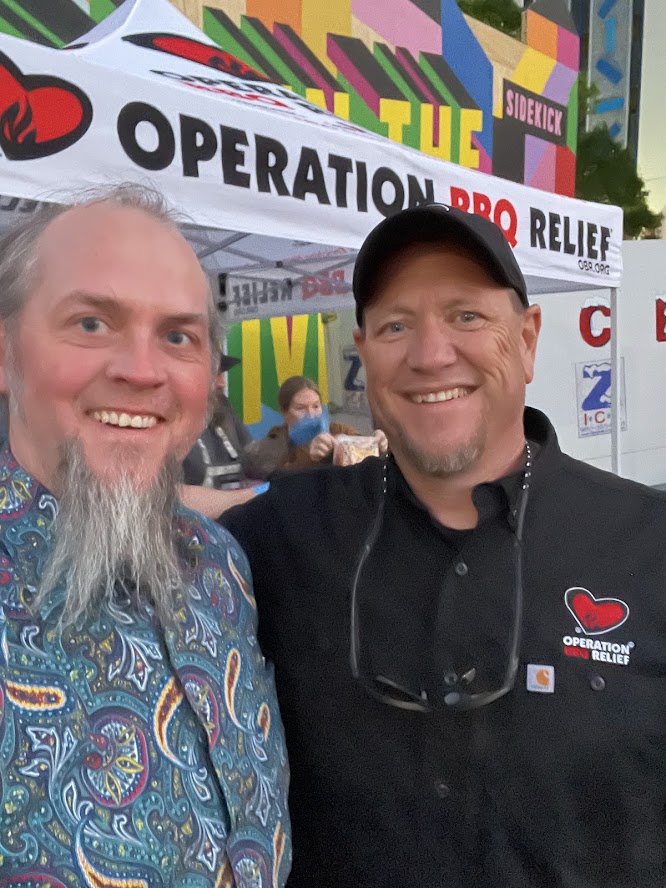
FAQ: Additional Questions about Operation BBQ Relief
What is the mission statement of Operation BBQ Relief?
MIssion: Operation BBQ Relief provides comfort to those in need by connecting, inspiring, serving, and educating in communities far and wide.
What are the values of Operation BBQ Relief?
Operation BBQ Relief values honesty, compassion, and respect for volunteers and those they serve. Decisions and actions of Operation BBQ Relief are always made and carried out with these values in mind. Operation BBQ Relief wants the communities it serves to be able to state without reservation that Operation BBQ Relief upheld these values while making a positive impact.
What is the vision of Camp Operation BBQ Relief?
Camp Operation BBQ Relief provides support, hope, compassion, and friendship to military, veterans, first responders, Gold Star, Red Star, and Blue Star families through long-term programs focused on overcoming physical, mental, and emotional challenges, strengthening families, providing a bonding experience, and engaging in quality rest and relaxtion.
How does Operation BBQ Relief select the deployment locations for disaster relief efforts?
Operation BBQ Relief selects deployment locations based on a combination of factors, including the severity of the disaster, the level of need in affected communities, and the organization’s logistical capabilities. They often coordinate with local authorities and disaster response agencies to ensure an efficient and effective response to emergencies.
Besides providing meals, what other forms of support does Operation BBQ Relief offer to disaster-affected communities?
In addition to providing meals, Operation BBQ Relief offers various forms of support to disaster-affected communities. This includes offering culinary therapy sessions, organizing outdoor activities for families, providing emotional support, and collaborating with local organizations to address specific needs. By focusing on holistic assistance, Operation BBQ Relief aims to help communities recover and rebuild in the aftermath of disasters.
How do Camp OBR retreats and how they specifically cater to the needs of Gold Star Dads?
Some Camp OBR retreats are specifically designed to cater to the needs of Gold Star Dads, who have lost a child in military service. These retreats provide a supportive environment where these fathers can come together, share their experiences, and find solace in connecting with others who have gone through similar situations. Through activities such as cooking workshops, outdoor adventures, and communal meals, Camp OBR aims to honor and support these individuals while fostering a sense of camaraderie and healing.
About the Author

Smoked meat, barbecue enthusiast, news journalist, and sports radio broadcaster Michael “Chigger” Willard collects a storybook of life captured through the lens of people he encounters. With a perspective seasoned by small town life in the Deep South, he dedicates conversations to uncovering savory nuggets of information, light-hearted moments of humor, and revealing glimpses of humanity.
Want more?
- Podcast Episodes
- Barbecue Blogs
- BBQ News & Recipes
Subscribe to The Lowdown BBQ Newsletter!


